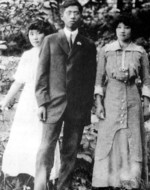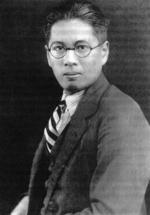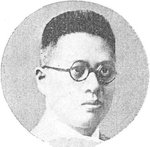Song Ziwen
| Surname | Song |
| Given Name | Ziwen |
| Born | 4 Dec 1894 |
| Died | 26 Apr 1971 |
| Country | China |
| Category | Government |
| Gender | Male |
Contributor: C. Peter Chen
ww2dbaseSong Ziwen, also known as T. V. Soong (from Wade-Giles Romanization Soong Tse-Ven), was born in Shanghai, China in 1894. He had three sisters, all of whom married prominent Chinese politicians (Song Ailing married Kong Xiangxi, Song Qingling married Dr. Sun Yatsen, and Song Meiling married Chiang Kaishek). He received his undergraduate degree from St. John's University in Shanghai, and then went to the United States for his master's degree in economics at Harvard University (1915) and then his doctorate degree in economics at Columbia University. In the United States, he briefly worked for the National City Bank of New York, the forerunner of Citibank. Returning to China in 1917, he worked at the Shanghai office of a company owned by a family friend. In early 1923, he worked as Dr. Sun Yatsen's translator in Guangdong, China. In Apr 1923, when Sun embarked on the task of establishing a central bank for the Republic of China, Song was involved in the planning; in Aug 1924, he was named the president of the Central Bank of China. In 1925, he took on a concurrent role as the Minister of Finance. In Dec 1927, he became Chiang Kaishek's brother-in-law as Chiang married his younger sister Song Meiling. By Jan 1928, he was a member of government committees in the fields of foreign diplomacy, budget, flood control of the Yellow River, and defense. Between Jul 1928 and May 1930, he negotiated tariff rates with the United States, Japan, Germany, and the United Kingdom. In Oct 1928, he was named the president of the reformed Central Bank of China, now headquartered in Shanghai; he would hold this position until 1931. In Jan 1930, he took on a concurrent role as the deputy chief of the Executive Yuan; in this role he was credited with currency reforms and the establishment of a police force to enforce taxation. Between Aug 1932 and Apr 1933, he served as the acting chief of the Executive Yuan. In 1933, he made diplomatic visited to the United States and various European nations. In 1936, during the Xi'an Incident in which Chiang Kaishek was kidnapped by the more radical faction in the Nationalist Party dissatisfied with the lack of action against Japan, Song played a role in negotiating between the two sides. Song's tenure in government posts in the 1930s were viewed as successful, especially as he was able to balance the Nationalist government's budget, bringing the debt problem under control. While he worked to finance the war with Japan which began in 1937, he also began to cultivate support for China in the United States. Song was also accused of corruption, however, using his authority to expand his business empire. When American aid became to flow into China, he was also accused of stealing from this funding.
ww2dbaseIn 1940, Song was dispatched to the United States to secure support, financial and otherwise. He played an important role in the formation of the American Volunteer Group, "Flying Tigers", particularly in terms of the financing of this force. In Dec 1941, he was named the Minister of Foreign Affairs, but he would remain in the United States. In 1942, he represented China in the signing of the Declaration by United Nations during the Arcadia Conference in Washington DC, United States. In Dec 1944, he became the chief of the Executive Yuan. In Apr 1945, he led the Chinese delegation to the United Nations Conference on International Organization in San Francisco, California, United States. In Jun 1945, he became the Premier of the Republic of China (as the chief of the Executive Yuan), a role he had been serving since Dec 1944 in an acting status. In Aug 1945, he negotiated an agreement with Joseph Stalin for the Soviet Union to recognize the Republic of China, thus for the Soviets to not recognize the Chinese Communists; in exchange, he gave the Soviets the use of the rail network in northeastern China, a military base at Port Arthur, and the dominance over Outer Mongolia. In Mar 1947, he stepped down as the chief of the Executive Yuan. In Sep 1947, he was named the chairman of Guangdong Provice, China.
ww2dbaseIn 1949, the Chinese Communists achieved victory in the civil war, and the Republic of China was withdrawn to the island of Taiwan. While most Nationalist leaders went to Taiwan, Song instead went to Hong Kong, and then moved to the United States, settling down in New York in Jun 1949. He was ranked as one of the world's richest individuals at this time. He passed away in San Francisco, California, United States in 1971, leaving behind a fortune worth US$5,000,000.
ww2dbaseSource: Wikipedia
Last Major Revision: Mar 2012
Song Ziwen Interactive Map
Photographs
 |  |  |  |
Song Ziwen Timeline
| 4 Dec 1894 | Song Ziwen was born in Shanghai, China. |
| 22 Sep 1925 | Song Ziwen was named the Minister of Finance. |
| 25 Sep 1930 | Song Ziwen was named the acting chief of the Executive Yuan. |
| 18 Nov 1930 | Song Ziwen stepped down as the acting chief of the Executive Yuan. |
| 23 Jul 1931 | Song Ziwen survived an assassination attempt at the Shanghai North Railway Station in Shanghai, China. |
| 25 Aug 1932 | Song Ziwen was named the acting chief of the Executive Yuan. |
| 17 Mar 1933 | Song Ziwen stepped down as the acting chief of the Executive Yuan. |
| 23 Dec 1941 | Song Ziwen was named the Minister of Foreign Affairs. |
| 4 Dec 1944 | Song Ziwen was named the acting chief of the Executive Yuan. |
| 4 Jun 1945 | Song Ziwen was named the chief of the Executive Yuan; he had been serving in this position in an acting status since Dec 1944. |
| 30 Jul 1945 | Song Ziwen stepped down as the Minister of Foreign Affairs. |
| 14 Aug 1945 | Chinese Foreign Minister Song Ziwen informed US Ambassador in Moscow, Russia W. Averell Harriman that China and the Soviet Union had come to an agreement on all major issues being negotiated for the Sino-Soviet Friendship Treaty, and it was about to be signed into effect. |
| 14 Aug 1945 | The Sino-Soviet Friendship Treaty was signed in Moscow, Russia by Song Ziwen and Vyacheslav Molotov. The USSR recognized the Nationalist Party as the sole ruling entity in China, and pledged to respect Chinese sovereignty and Chinese borders. China allowed the Soviets effective control of Dairen, Port Arthur, and various regions of northeast China. The Chinese delegation was surprised with the Soviet demand for China to cede Outer Mongolia as an independent nation; Song Ziwen, leader of the delegation, reluctantly agreed, knowing that the Soviet pledge to recognize the Nationalists was a greater gain. The Soviets also forced China to agree to a future referendum in Inner Mongolia, allow the people to choose whether they would join independent Mongolia. |
| 1 Mar 1947 | Song Ziwen stepped down as the chief of Executive Yuan. |
| 18 Jan 1949 | The Chinese Ministry Of National Defense, by orders of Chiang Kaishek, dropped Tang Enbo's other responsibilities thus concentrating his attention on his position as the commanding officer of the Nanjing-Shanghai-Hangzhou Garrison, merged the training-logistics commands of Quzhou into that command in Fuzhou with Zhu Shaoliang as its chief, named Zhang Qun as the chief of the Chongqing training-logistics command, named Yu Hanmou as the chief of the Guangzhou training-logistics command thus concentrating Song Ziwen's attention on his position as the Chairman of the Guangdong Provincial Government, and upgraded the Taiwan Garrison with Chen Cheng as its chief and Peng Mengji as its deputy. |
| 26 Apr 1971 | Song Ziwen passed away from a stroke in San Francisco, California, United States. |
Did you enjoy this article or find this article helpful? If so, please consider supporting us on Patreon. Even $1 per month will go a long way! Thank you. Share this article with your friends: Stay updated with WW2DB: |
» Xi'an Incident
» First Washington Conference
- » 1,150 biographies
- » 337 events
- » 44,024 timeline entries
- » 1,242 ships
- » 350 aircraft models
- » 207 vehicle models
- » 375 weapon models
- » 123 historical documents
- » 260 facilities
- » 470 book reviews
- » 28,622 photos
- » 431 maps
Chiang Kaishek, 31 Jul 1937
Please consider supporting us on Patreon. Even $1 a month will go a long way. Thank you!
Or, please support us by purchasing some WW2DB merchandise at TeeSpring, Thank you!